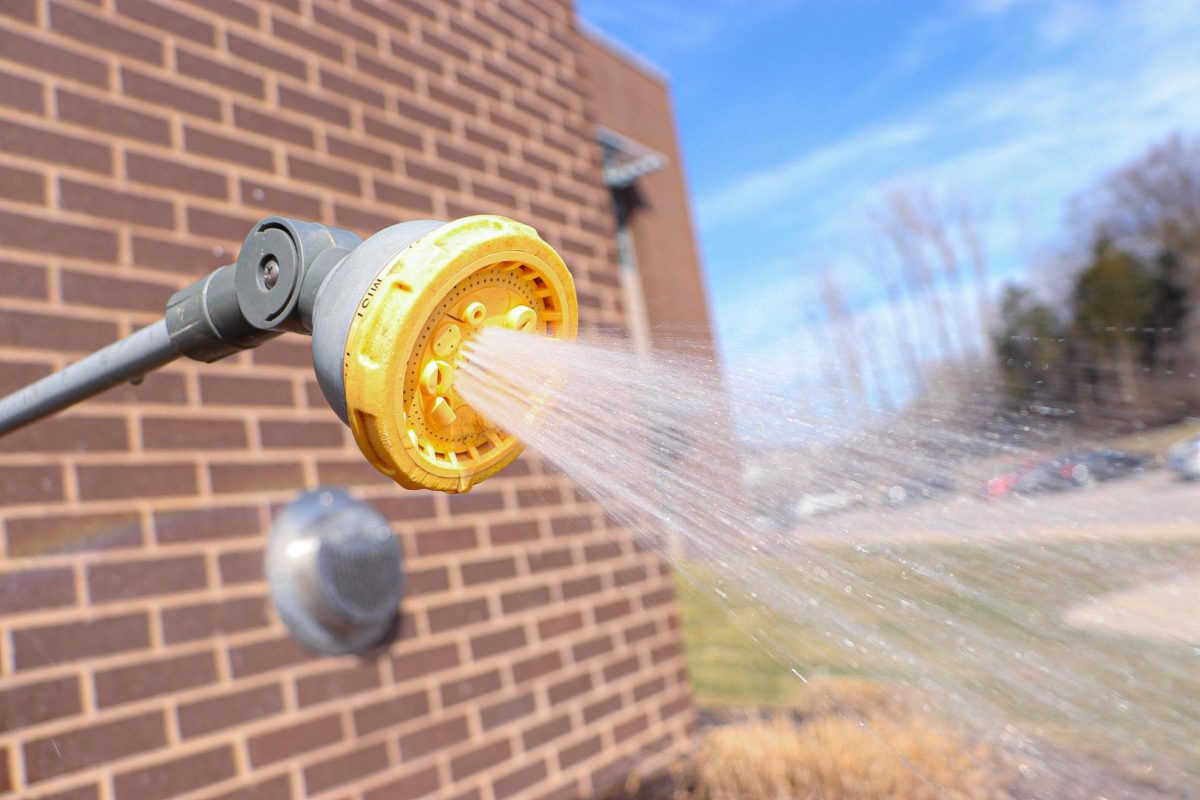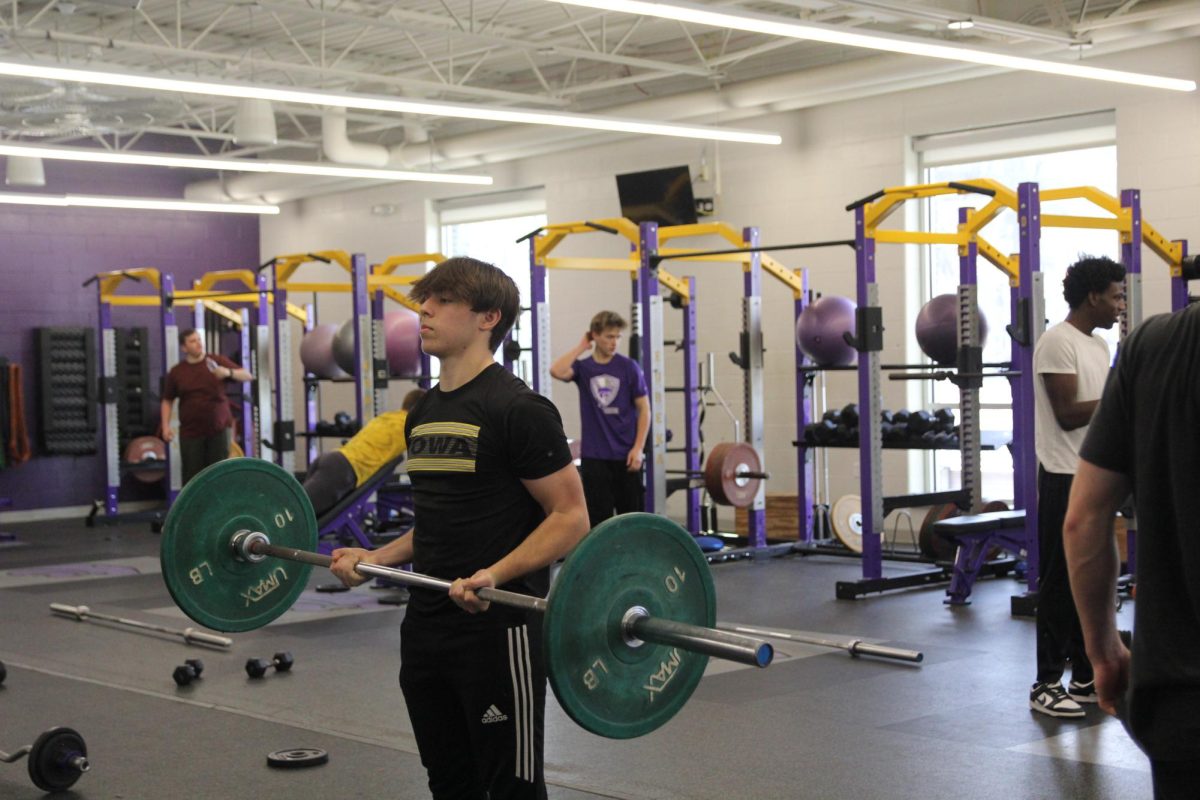On March 1, Eureka students were evacuated from their first class of the day due to a strong burning smell and hazy smoke being reported by both students and staff. Students were cold, as the temperature was only 45 degrees, and staff were frustrated at the loss of valuable class time.
Eureka Fire responded to the scene and reported that the smoke and smell were the result of a spark in the HVAC system located above the band room, effectively destroying the functionality of the unit.
While students and staff were displaced for less than an hour, members of Eureka’s band program was displaced for over a month due to the lack of a working HVAC unit. However, the music department is no stranger to facility failures or poor classroom conditions. This single-day issue is just the tip of a decades-long iceberg of struggle.
Following the incident, the band quickly was forced to assess the damage and come up with a plan of action for the unknown amount of time they would be displaced from their classroom.
“Since we have thousands of dollars of equipment in that room, it presented two problems,” Brad Smelser, Eureka Band Director, said. “First, we have to make sure that the equipment is safe because most of that stuff is bought by taxpayers. So we need to be responsible for our things as representatives of the district. The second part of that is finding a space to rehearse, which is the bigger component.”
The solution? Set up the class in the small theater for the time being. But this solution was quickly discovered to be both extremely inconvenient and defective.
“It takes a bunch of class time out because we’re at the beginning of every class we’re having to set up,” Band Student Isabella Tumminello, 11, said. “We’re in a location that does not fit the size of our band. We hardly all fit on stage. The stage is cracked and broken. The space is really, really loud and it’s hurting our ears because the music’s going right back into the little space. And then we’re having to close it all down at the end of band class too and that’s taking away from our time.”
As previously mentioned, even before band classes were relocated, other equally startling issues were present in the band classroom. One of these is mold, created by a combination of high humidity levels in the music wing. Such is a result of the HVAC systems in the music department not containing dehumidifiers.
“A huge problem with that is brass instruments are nasty, and you have to empty your spit valve after playing,” Tumminello said. “So they already knew the carpet and everything was at risk for mold and it should be changed out every so often, and it has not been. They also know that if they’re not changing it out, it needs to be deep cleaned by actual machinery, like every single summer and that does not happen.”
Eureka’s band is not fighting this battle solo. Both Eureka’s orchestra and choir departments have also experienced their fair share of issues, many of which are all a result of the same recurring issue: the lack of a humidity control system.
The choir room receives the brunt of it, with the main suspect cause being that the classroom is connected to Eureka’s natatorium, which requires a hot and humid climate to meet regulations. Nathan Schaefferkoetter, Eureka choir director, has personally tracked the humidity levels in his classroom over the past year.
“For most of March, I’ve been tracking the humidity inside and outside and I want to say that 75% of those days have been more humid inside than outside,” Schaefferkoetter said. “So somewhere we’re bringing humidity in, and the facilities department doesn’t know how to fix it.”
Furthermore, the chlorine smell that is associated with any swimming pool, is also being filtered into the music wing, along with the humidity, and is potentially creating health concerns for the teachers.
“All of the music teachers have been sicker this year than we’ve ever been, and that smell is worse than it’s ever been,” Mary White, Eureka Orchestra Director, said. “It’s always been there but in the past few years, it’s ramped up so much. It is definitely affecting our respiratory health.”
Not only is the health of the teachers at risk, but students are also struggling to battle against these potentially dangerous conditions.

“I have students who have asthma attacks when they come into my room,” White said. “I had a clinician come in for a PD day, who within half an hour of giving a clinic in my room, had a full-blown asthma attack, and she’s allergic to mold. I’m on full-time asthma maintenance now, which I haven’t been on in 25 years.”
According to Chris Fruend, Rockwood’s Director of Facilities, the smell is not something that can be completely eliminated due to standards set by the American Society of Heating, Refrigerating, and Air-Conditioning Engineers (ASHRAE).
“The chlorine smell that has been experienced in the area is due to the amount of fresh air we are required by ASHRAE to bring into our spaces,” Fruend said. “This is a challenge to control at times when outside air conditions carry odors or extreme humidity levels. We are not able to decrease the amount of fresh air introduced into our learning spaces. We must be compliant with ASHRAE thresholds since we are
conditioning a K-12 environment.”
With a combination of an overwhelming odor and the high humidity levels of these classrooms, it is no surprise that it is also greatly affecting the ability of students to focus.
“There definitely is a student-focus issue because it gets very hot and sweaty,” Schaefferkoetter said. “Generally, we average from probably 65% humidity to anywhere to 81% humidity inside throughout the year, and so even with fans it’s just hot and we’re being active. Music is an active class.”
To make matters worse for students, the humidity is actually damaging the equipment and instruments required for class, and therefore the learning, taking place. Both orchestra and band are now low on instruments because so many of them have been either broken or sent off to be repaired.
“When it’s warm outside, the humidity gets super high over here, which is not good, obviously, for mold and other things like that,” White said. “When it’s cold, it gets so dry over here that one year I came back from winter break, and all but four of my cellos and basses
had cracked open because the humidity level was so low that the glue cracked.”
As one would assume, the cost of fixing these instruments is not cheap.
“I play and it’s a $22,000 bari-sax [baritone saxophone],” Tumminello said. “That’s one instrument, and they’re having to put hundreds and hundreds of dollars into fixing that one instrument because the cork is broken on it because they’re not doing anything about the humidity in the room.”
In all three departments, the humidity also affects the invaluable music sheets causing them to wilt, grow damp, or even mold.
“There’s tens of thousands of dollars of music in there that’s all paper, and [the humidity] really affects that. This summer when we started class, our music was limp, soggy, and gross,” Schaefferkoetter said. “It’s really oppressive and it feels bad that no one seems to care to fix it.”
In the past, the fix to the mold created by the humidity was to simply remove the mold from the classroom walls. However, this is only a temporary fix to the issue.
“You can cut the drywall out, replace it, and get rid of the mold,” Dr. Corey Sink, Head Principal and Music Department Supervisor, said. “But, you have to fix the problem that’s causing it. And it can get into the carpet, then that’s got to be ripped out, and all sorts of things.”
Both Sink and other administrators have explored numerous ways to help ease the struggles that the music department battles, but there does not seem to be a quick solution.
“We’ve looked at a couple of different options like cutting a hole in the roof in the choir rooms. There’s some piping and some different things that can be vented differently,” Sink said. “Again, every time we try to do something, we run into problems. So it’s not a simple fix. Now, the HVAC unit that’s over the band room, is the one that released gas into that classroom and then caught fire. It disrupts not only those classrooms but the entire school.”
Both Sink and the music teachers have reported these issues to Rockwood numerous times over the past decade, and have received a similar response each time.
“The answer has been we don’t have a way to control humidity in your wing. Period,” White said. “We’ve been saying for seven years that there’s something wrong with that HVAC and then it catches on fire. Obviously, maybe they should have listened a little earlier.”
The District claims that at this moment, the best solution is stand-alone humidifiers, something the department has been utilizing for years.
“We have not installed a new unit in the district without dehumidification for approximately 10 years,” Fruend said. “With that said, it will take an extended period of time and financial commitment to address all of the outliers still serving our buildings. When we have a specific impacted area such as a space that houses instruments or books, the best option is to bring in stand-alone dehumidifiers. These units are the best option at this point until major HVAC renovations are able to take place. Realistically, it may be several years before a large-scale HVAC replacement takes place at EHS.”
The department’s main complaint with this solution is that because the humidity is so high, the dehumidifiers fill up with water quickly, and if someone is not constantly monitoring and emptying them, they will shut off. However, this may be something that the department might have to get used to for a while.
“A large-scale replacement is not realistic at this time, as there are greater needs regarding older systems included in the nearly 4 million square feet of building space throughout the district,” Fruend said. “Proposition 3 funding will be utilized to eventually complete the replacement of all of the units serving EHS, including the band area. We are scheduled to replace the unit serving the main gym this summer. EHS is the largest campus in the district. As a result, we will be developing a phased-in approach for replacements in the future.”
The silver lining in all of this? As of April 1st, the HVAC system above the band room has been fixed, with a dehumidifier included in the unit. This has allowed band students to return to their classroom with the promise that conditions in the room will only continue to improve. This experience has also fostered both student and staff cooperation, which has created an environment where they assist each other where they lend a helping hand when needed.
“I think all the teachers have been really awesome in being flexible and accommodating,” Smelser. “ I think our administration has been doing the best they can to make sure that we know what’s going on or what they can tell us at least. So it’s been a little bit of a blip, but I’m glad it’s fixed. And we kind of roll with the punches a little bit, which is all you can do. No use getting upset about anything. It’s out of our control.”






















